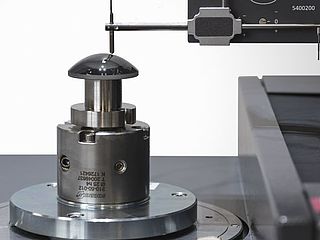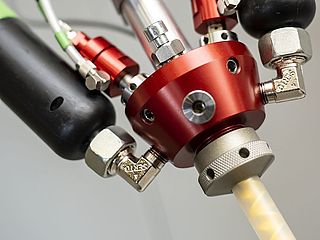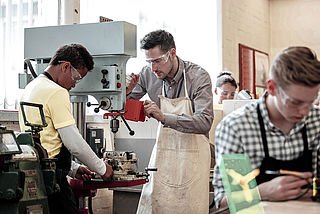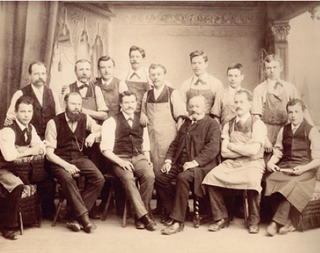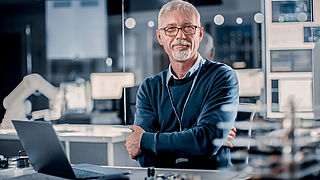From Tunisia to Germany for master's project at Mahr

26-year-old Azza Feki comes from Tunisia and is good at technology – very good, in fact. With her talent, she was able to successfully secure funding from the Deutschlandstipendium to complete her master's degree in electrical engineering and information technology in Germany. This makes her one of around 2,600 recipients of the Deutschlandstipendium in Lower Saxony (as of May 2022). She is actively supported by Mahr GmbH. Source: Federal Ministry of Education and Research
The Deutschlandstipendium and its actors
The Deutschlandstipendium is a Germany-wide scholarship program for talented students at state and state-recognized universities. Students apply to the universities and, as selected scholarship holders, receive €300 per month in financial support until the end of their studies. The universities in turn organize part of the funding and recruit private sponsors, who provide half of the monthly support (i.e. €150 per month). The second half is added from the federal budget.

Mahr is a sponsor of the Deutschlandstipendium (German Scholarship)
The universities create opportunities for the sponsors and the scholarship holders to get to know each other. The sponsors can also offer the scholarship holders additional support, such as internships or continuing education events (but they are not obligated to each other). This is how it is for Azza Feki; she is studying at HAWK Göttingen and is interning at Mahr GmbH for six months as part of her master's thesis. Here she is able to test and develop her theses directly in practice.
Scholarship holder Azza Feki
Azza has always been interested in technology. Her mother's cell phone in particular piqued her interest when she was young – how does it work? What does it contain? She found the answers herself back then by taking the cell phone apart without further ado. Azza smiles about this anecdote today: "I broke the cell phone by doing this. But I've always been like that: I want to try new things, discover new things and find out why things work the way they do." So for her, it was clear early on what direction she wanted to take professionally, although she hasn't yet specified her final destination. Engineering, possibly manufacturing, maybe the automotive sector at Audi or BMW? In any case, she wanted to complete her studies in Germany, "simply a good address for these subject areas."
From Tunisia to Göttingen – and to Mahr
Azza has been in Germany since 2016. She came here alone when she was 19 years old. She first learned German in Hanover and then went to Göttingen for her bachelor's degree. After successfully completing her studies, she enrolled for a master's degree in electrical engineering and information technology with a focus on engineering informatics at HAWK Göttingen. At a meeting of sponsors and recipients of the Deutschlandstipendium, she was able to establish contact with the Mahr company and succeeded in obtaining the possibility for work shadowing there for her master's project – which she has been doing since September 26, 2022. The master's project of the quadrilingual Azza involves programming a new C++ language library – in other words, developing a new automated user interface. "For my master's project, I'm working in the software development department at Mahr, and here I have the opportunity to develop and implement my approaches, do research, and participate in training." She says it helps enormously to have the opportunities and environment to directly test her formulas and coding and not just deal with them on a theoretical level. Azza now only needs one more exam and, ultimately, the completion of her master's thesis to graduate later this year.

An experience worth having
Of course, it's always a struggle to leave home and family. "I was really nervous at the beginning and was afraid that the language barrier would be a problem," says Azza; after all, she only learned German after arriving. "But I settled in quickly and never felt like I was alone." She appreciates German culture and feels safe, saying, "Life is better here." That's why she can imagine staying in Germany after graduation. But she doesn't have any concrete plans. "I prefer to focus on the here and now, without stressing myself out. I just want a job where I feel comfortable."
Facts about the Deutschlandstipendium
The Deutschlandstipendium was first available in the summer semester of 2011. In 2021, around 29,000 scholarship holders worldwide were supported, more than half of them women. The 312 participating universities were able to raise funds from around 8,400 private sponsors, including Mahr GmbH. A total of around 256 million euros has been raised by sponsors since the program began, including 30.3 million euros in 2021. Source: Federal Statistical Office (2022, May 31): Funding under the Scholarship Program Act (Deutschlandstipendium) 2021; available at: Homepage - German Federal Statistical Office (destatis.de)






